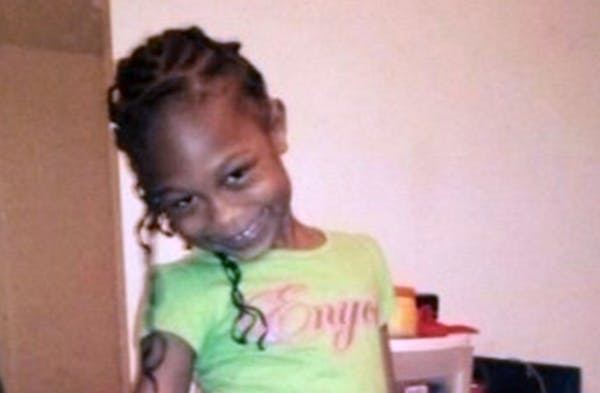Minnesota's foster care system is falling short of state and federal standards meant to ensure that abused children are placed into stable and permanent homes, a Star Tribune review of state records has found.
Those records reveal that too many abused foster children in Minnesota are returned to their parents too quickly, suffer more maltreatment and end up back in foster care. Thousands of children have been further traumatized by being shuttled among numerous foster homes as they wait, sometimes in vain, for adoption, state records show.
As the number of foster children has grown to more than 11,000, fewer families are signing on as foster parents, records show. That problem could intensify, as a child protection task force formed by Gov. Mark Dayton recommended on Monday numerous reforms that will likely see more children removed from abusive homes.
"I don't think we're ready for that increase," Robert O'Connor, a member of the task force and a social work professor at Metropolitan State University, said after reviewing the data compiled by the Star Tribune.
He hopes for significant changes in areas "that the data suggests we're failing children."
In 2013, the most recent year data was available, Minnesota failed to meet the federal standard in seven of the 15 measures of placing children permanently and safely with families, records show.
"I think 20 years from now we'll look back at some of these numbers and we'll be astonished that we practice in this way," O'Connor said.
Lucinda Jesson, the commissioner for the Department of Human Services, which supervises the county-run foster care system, acknowledged that the state must make "much-needed improvements."
The task force, which Jesson co-chaired, approved four recommendations to improve foster care, including the development of a plan to place children in stable homes. A new law will allow parents who adopt to get the same compensation and services as foster parents receive, eliminating the financial disincentive to adoption.
That's what one former foster child believes left her without a permanent home.
Amanda Kissell-Bradley, 22, of Minneapolis, was put into foster care at age 12 after child protection received reports that she was being abused and her father was using drugs.
"I remember being on my way [to shelter] and the social worker saying, 'Things are going to get better now,' " she said.
Instead, she lived in four foster homes and aged out of foster care. Twice, she said her foster parents said they wanted to adopt her, but they told her it made more for them sense financially if she remained a foster child.
"No kid should ever experience what I experienced," she said.
'Traumatic'
At her Pine City home, Jennifer Wiechman estimates she has been a foster mother to at least 25 kids in the past nine years, adopting two of them. She said the abuse and neglect the children have suffered at the hands of their biological parents is often so severe that the kids are often violent and unable to connect with caregivers.
But Wiechman said one of her frustrations with foster care is that they are removed from her too quickly and come back again, even more damaged.
"I would like to see where kids' needs are thought of first and foremost, rather than adults' desires," Wiechman said.
Under federal standards fewer than 10 percent of the children reunited with their families should have to re-enter foster care within a year. Minnesota's rate is 25 percent, one of the highest in the country.
Jesson said one of her priorities in fixing the foster care system is lowering the re-entry rate by creating stronger family reunification plans.
"When you think about these kids, and having them move from one home to another is just traumatic," Jesson said. "Just going to a foster home is traumatic."
The death of a 6-year-old in a Brooklyn Park foster home in December raised questions about the oversight and licensing of foster homes in Minnesota. On Friday, DHS revoked the license of the foster care placement agency and the home after finding widespread violations.
Raised by the system
County child protection agencies and juvenile courts generally have about one year to find an abused child a permanent home. Yet records show that deadline has been missed for at least 4,000 children since 2009.
When Julia and Stewart Simon of Mound decided to adopt an older child three years ago, they found a 16-year-old girl who had spent three-quarters of her life in foster care.
The girl, now 18, did not want her name used because she does not want past abusers to find her. She said that when she first met the Simons, she just glared at them.
"I've been given up on so many times, I told them, 'Don't waste your time on me,' " she said.
But the Simons persisted and learned why the girl was so angry. Starting at age 4, she moved back and forth from foster care to her mother. She was 10 when her mother gave up her parental rights.
In three homes, she said she was told she would be adopted, only to have those hopes dashed.
Per federal standards, kids in foster care for two years or more should have to live in only one or two homes. Only 34 percent of Minnesota foster children meet that standard.
By the time the girl met the Simons, she had been in at least 13 placements.
She said she raised herself "to not care anymore" and thought she would eventually live on the streets.
Instead, the Simons adopted her. They've been through difficult times, but the girl who used to call Julia by a vulgarity now calls her "Mom."
One of the effects of being raised in foster care, Julia Simon said, is that her daughter has no self-esteem, and never learned basic social skills, such as whom to trust, or how to make friends.
Now 18, the girl doesn't expect much for a future, but says it's a better one than she imagined growing up. She's finishing high school, and hopes to turn her love for animals into a job working for a zoo or a veterinarian.
"I thought I was going to be a failure," she said. "Now I feel like I'm going to be living with Julia and Stewart for the rest of my life. I'm too scared to get my own place. I've never experienced what the outside world is."
'Bad to worse'
Other Minnesota foster children can reach what the state considers a permanent home, yet are never actually adopted. That's true for 19-year-old Rosalyn Feather, who said she felt like she never had a family growing up.
Social workers put her and her three siblings into foster care in 2002, when she was 6. Their mother was an alcoholic and addicted to sniffing paint, and the children often witnessed violent abuse at home, records show.
In 2004, when Rosalyn was 8, Hennepin County transferred legal custody of Rosalyn and her siblings to their foster mother, Diane Diederichs-Stokes. In the eyes of Minnesota, the children had a stable, permanent home.
To Rosalyn, "it went from bad to worse," she said.
She describes that time as so unstable that she and her sister began running away to try get back to their mother.
From 2005 to 2010, records show, Anoka County child protection received three reports that Rosalyn and her siblings were not being supervised, and two reports they were given inadequate medical care.
In 2011, when Rosalyn was 15, a social worker found the family living in a room at the Highway Hotel in Spring Lake Park, with one of the kids sleeping in a corner under a table, and another on a small chair stuffed with magazines, records show.
The next year, the county removed the children from Diederichs-Stokes' care.
In an interview, Diederichs-Stokes denied ever maltreating the children. She acknowledged that her homes were chaotic, but blamed it on the children.
"They were raised in so much violence, and so much drug use and alcohol abuse," Diederichs-Stokes said. "It was so much a part of them, and they just acted it out."
Since leaving Diederichs-Stokes, Rosalyn went back into the foster care system and estimates she lived in at least eight homes and treatment facilities in four years. She now lives in a transitional housing facility in St. Paul, where she wonders what life might have been like if she had a stable family.
"I just wanted two parents and to be with my siblings," she said. "To not have to worry about where I would be sleeping and what I would be eating."
Brandon Stahl • 612-673-4626

In Grand Rapids, Itasca Pride is planning its first event, but there is already pushback
One person shot at YMCA in Coon Rapids

BCA says man pointed pistol-style BB gun at officers before he was shot in Woodbury

Former diversity worker sues University of Minnesota after firing over swastika photo

